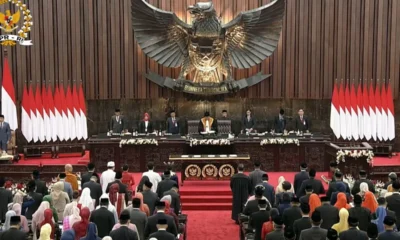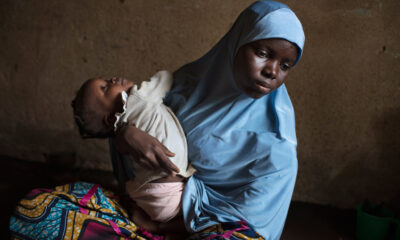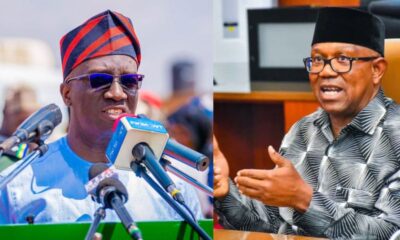Africa
Is The NBS Subtly Legitimizing Prostitution By Including It In Nigeria’s GDP?, by Isaac Asabor

The recent announcement by the National Bureau of Statistics (NBS) to include illegal activities such as prostitution and drug peddling in Nigeria’s Gross Domestic Product (GDP) calculation has sparked widespread debate. The move, described by NBS officials as aligning with international best practices under the System of National Accounts (SNA) 2008, raises ethical, social, and economic questions that Nigeria must grapple with.
On the surface, the NBS’s decision appears technical, even logical. It aligns Nigeria’s economic accounting with international standards, capturing hidden and informal economic activities that contribute to the nation’s economic output. This inclusion is not unique to Nigeria; countries like the United Kingdom, Canada, and Italy have incorporated similar calculations into their GDP. However, in a society where morality and legality often clash with economic pragmatism, the implications of such a move warrant deeper scrutiny as it has raised the question of whether prostitution is an economic activity or a social Ill?
Prostitution, often referred to as the world’s oldest profession, is illegal in Nigeria. It is a practice condemned by cultural, religious, and moral norms across the country. Including it in GDP calculations seemingly acknowledges its existence as an economic activity. But does this acknowledgment inadvertently legitimize it?
The NBS has argued that the inclusion is purely statistical and does not equate to legal acceptance. Yet, the line between recognition and legitimization is thin. By quantifying the economic contributions of prostitution, the government indirectly assigns value to an activity it deems illegal. For a country struggling with moral decadence, youth unemployment, and gender-based violence, this could send a contradictory message. It raises the question: “How does a society reconcile its legal and moral stance against prostitution with the economic recognition of its contributions?”
From an economic standpoint, the informal and illegal sectors contribute significantly to Nigeria’s economy. Prostitution, drug peddling, and other hidden activities provide livelihoods for many and, ironically, may fill gaps left by the formal sector’s failures. For example, many women engage in prostitution as a last resort due to poverty and lack of opportunities. Including their earnings in GDP calculations reflects a harsh economic reality but does not address the root causes of their plight.
Critics argue that focusing on these activities detracts from efforts to combat them. Instead of quantifying the contributions of prostitution to GDP, should the government not prioritize eradicating the socioeconomic conditions that drive individuals into it? The inclusion risks normalizing activities that undermine societal values, perpetuate exploitation, and exacerbate inequality.
Countries that include prostitution and other illegal activities in their GDP often have robust legal and regulatory frameworks to address these sectors. For instance, in the Netherlands, where prostitution is legal and regulated, its inclusion in GDP aligns with national policy. In contrast, Nigeria’s inclusion of prostitution and drug peddling occurs in a legal vacuum. These activities remain criminalized, unregulated, and stigmatized, creating a stark dissonance between economic accounting and governance.
Moreover, international examples highlight potential pitfalls. While GDP inclusion may provide a more comprehensive economic picture, it does not necessarily translate to improved policymaking or societal outcomes. For instance, Italy faced criticism for including illegal activities in its GDP, with skeptics questioning the accuracy of data collection and its impact on public perception of crime.
Another critical issue is the reliability of data. How does the NBS intend to measure the economic contributions of illegal activities accurately? Prostitution and drug peddling operate in secrecy, making data collection fraught with challenges. Estimates are likely to rely on assumptions and proxies, raising questions about their accuracy and credibility. Additionally, including such activities in GDP calculations could incentivize further illicit behavior, as individuals and groups may exploit the statistical acknowledgment for personal gain.
The NBS argues that rebasing GDP to include hidden activities provides a more accurate reflection of the economy, aiding policymaking and attracting investment. However, the inclusion of illegal activities could have unintended consequences. Policymakers may face pressure to address the economic significance of these sectors, potentially diverting attention from formal sector development.
Furthermore, the move risks alienating foreign investors with strict ethical guidelines. Companies and institutions may hesitate to engage with a country that economically recognizes illegal activities, fearing reputational risks. This could undermine the very goal of enhancing Nigeria’s attractiveness as an investment destination.
Rather than focusing on the economic contributions of prostitution and other illegal activities, Nigeria must prioritize addressing the underlying factors that drive their proliferation. This requires investments in education, job creation, social welfare, and gender equality. By tackling poverty, unemployment, and inequality, the government can reduce reliance on illicit activities and foster a more inclusive and sustainable economy.
Additionally, the inclusion of illegal activities in GDP calculations should be accompanied by a robust public discourse. Citizens, policymakers, and civil society must engage in open discussions about the ethical, social, and economic implications of this decision. Transparency in data collection and reporting processes is essential to maintain public trust and avoid misinterpretation.
Without a doubt, the NBS’s decision to include prostitution and other illegal activities in GDP calculations highlights the complexities of modern economic accounting. While it aligns with international best practices, it also raises profound ethical and social questions. As Nigeria navigates this uncharted territory, it must ensure that economic pragmatism does not overshadow moral and societal values. The government must strike a delicate balance between recognizing economic realities and upholding the principles that define the nation’s identity.
In the end, the real measure of a nation’s progress lies not in its GDP figures but in the well-being, dignity, and opportunities afforded to its citizens. Nigeria must focus on building an economy that reflects the best of its people, not merely the sum of their struggles and compromises.




























